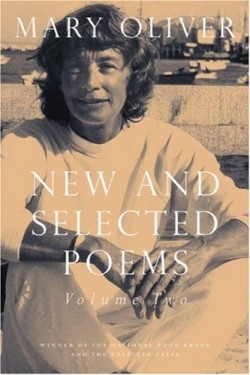New and Selected Poems
Volume Two
This poet contemplates the natural world with deep and soulful attention, and then, with simple words sparely arranged, verbalizes the relationship between Earth and the human spirit. She provides the modern voice of the spirituality inherent in consideration of Nature.
This volume is the much-anticipated follow-up to Oliver’s 1992 New and Selected Poems, Volume One, which won the National Book Award. She has written more than ten books of poetry and prose, including two poetry-writing handbooks; her American Primitive won the 1983 Pulitzer Prize. Here, forty-two new poems appear with selections from her previous books.
Oliver’s poems are still and quiet, providing moments of intense awareness of self and other. In “Yes! No!” from White Pine, she writes: “To pay attention, this is our endless and proper work.” In writing that is deeper than description, Oliver says that it’s not enough to notice the miraculous, profound beauty of the planet. Attentive souls can learn about human nature from Nature, and in order to take their proper place in the universe, humans must learn about the interconnectedness of everything. She articulates natural beauty, and then sparks an epiphany of meaning, verbalizing these spiritual lessons without preaching or didacticism. One poem asks a series of questions about the mystic in nature: “What if the brook slid downhill just / past your bedroom window so you could listen / to its slow prayers as you fell asleep?” The title (“How Would You Live Then?”) serves as the poem’s conclusion
Although humans rarely appear in Oliver’s poems, one in this collection is especially poignant. In Oxygen, a loved one struggles for air: “You are breathing / patiently; it is a / beautiful sound. It is / your life, which is so close / to my own that I would not know / where to drop the knife of / separation.” That knife was dropped last August, just as this book was coming to print, with the death of Oliver’s longtime companion, Molly Malone Cook.
In the new poems, Oliver pays more heed to her own writing process, and to the essential role of poetry in life. In “Everything” she writes: “I want to make poems while thinking of / the bread of heaven and the / cup of astonishment; let them be // songs in which nothing is neglected.” Oliver’s transcendent notice neglects nothing, yet she remains humble in the face of the glory of creation. In “White Heron Rises Over Blackwater,” she muses, “the pencil / haltingly calling up / the light of the world, / yet nothing appearing on paper / half as bright // as the mockingbird’s / verbal hilarity.”
John Keats wrote, “The poetry of the Earth is never dead.” Oliver’s poetry is of the Earth, and about the Earth, and as these poems give voice to the planet, they render human life more beautiful, more sentient, more meaningful.
Reviewed by
Karen McCarthy
Disclosure: This article is not an endorsement, but a review. The publisher of this book provided free copies of the book to have their book reviewed by a professional reviewer. No fee was paid by the publisher for this review. Foreword Reviews only recommends books that we love. Foreword Magazine, Inc. is disclosing this in accordance with the Federal Trade Commission’s 16 CFR, Part 255.

